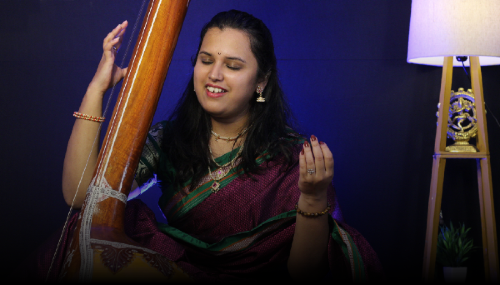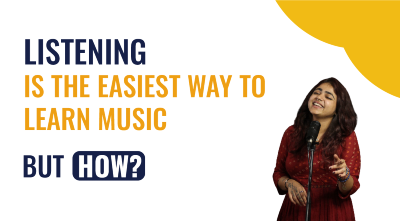
Table of Contents
"Which is easier, a Film song or a Carnatic song?"
"Is learning Carnatic music a difficult and hard journey?"
Above are some common questions students ask before starting music classes online or offline.
Would you believe it if I told you Carnatic music is an ocean and we can have a lot of fun over it?
When I first started learning music, I too believed that Carnatic music would be boring. And it took a long time to realize the importance of such divine music.
"I never thought Carnatic music would change my life and would play such an important role in my life!"
I realised that practicing Carnatic music is very similar to practicing mindfulness. And like Ludwig Pesch, a German-born musician and educator, wrote:
"Does this Carnatic Music not sound like a remedy for the ills of our times? Like the many distractions imposed by modern lifestyles, our inability to focus on the task at hand..."
That’s the point where I started handling Carnatic music with more love and care. Now, I can't survive a single day without singing, especially Carnatic music.
And I would like to share some of the things that helped me love Carnatic music with you...
People may have different thoughts and opinions about music.
What one person may consider underrated and boring, another may consider a fascinating masterpiece.
Carnatic music has a rich history and cultural significance. Many people find it to be beautiful and expressive, while others may not be as drawn to it. Ultimately, it’s a personal taste.
Is Carnatic Music really boring?

Usually, people say that Carnatic music lessons for beginners are boring.
Because in the Carnatic music tradition, the foundations of learning music - swaras and swarasthanas - are highly important.
So, in the beginner classes, the emphasis is placed on mastering the swaras, and that only happens with practice.
An average learner needs to keep patience for at least one or one and a half years to understand what the basic swaras are.
But this doesn't mean that for a year and a half, the student does not sing anything else. It's important to have fun while learning and that depends largely on the Carnatic music teachers.
In the beginning, we need to understand how the swarasthanas work, the formation of swaras, the gamakas, and so on.
Along with that, to make it fun for the students, adding some songs of their choice and introducing some new concepts can keep the learning process engaging in Carnatic music classes for beginners.
The Golden Period in Carnatic Musical Journey
People may say that learning the swaras in an orderly manner is difficult.
But the truth is that this stage is your Golden Period in the Carnatic music journey because this is when you understand pitch, rhythm, scales, and the other technical skills in a detailed manner.
This is also when you develop listening skills through ear training. It helps in identifying the different aspects of a song. Because only when you can identify them, you'll be able to develop your voice to sing them.
Want to know more about ear training? Click here.

Train your Ears
Listening is as important as singing.
As you all know, our ears and voice are the backbone of our singing. A sharp ear can understand the music in its depth and of course, can execute it well.
Right from day one itself one should be ready to start their ear training.
Ear training can be done in different ways.
Start with the very simple one, that is just listening to the swaras or the musical part that you have learned in the first class. It’s not mandatory to sing along from day one itself.
Singing is a slow process. One can improve their singing only through listening.
Train your Voice
Voice training is another important factor that you can't avoid.
It's not about developing the beauty of your voice, but developing the different octaves in singing, and other singing aspects.
How do you sing? Do you have an interest in singing? Are you aware of the technical and practical aspects of Carnatic music - all these matter.
To improve your vocal texture you can start doing the Carnatic vocal exercises and breathing exercises for breath control as this plays a vital role in singing.
You can check out the free music tools to aid your practice.
Note that you should always make sure that your ears and voice are in good sync so that you can sing confidently.
For this, you can play the Tanpura/Shruthi Box from the music tools. Listen to the sound of the tanpura, and practice.
Is Carnatic Music Underrated?
Carnatic music is one of the best-studied music traditions in the US.
But for the public, in general, the traditional aspects of Carnatic music are overlooked in favour of film music across languages because film music can please people with the lyrics, theme, visualisation, tune, expressions, and so on without requiring much attention in return.
Carnatic music, on the other hand, requires a total immersion. This is the reason why the joy of Carnatic music is considered similar to practicing mindfulness.
And because Carnatic music emphasizes the fundamentals, a Carnatic music student can easily sing film and other songs by identifying their notes and ragas by ear.
Patience is the key to Success
Learning any new skill whether it's singing, dancing, learning a language, or playing a sport requires time, practice, and consistency. Carnatic music is no different.
It's not about completing the course within one or two years. That should not be your aim.
You should be well-planned and prepared before you begin your music classes. It will take time and this is a long-term commitment. But the journey will give you a big result for your singing abilities as well as your personality.
Research shows that music lessons make your brain sharper and also relieve stress making you happier.
So, take your first step towards learning Carnatic vocals. And leave the rest to us with supportive Carnatic music teachers who will make learning fun and interesting for you.
- Anagha Murali
Carnatic Vocal SME,
Spardha School of Music
